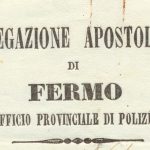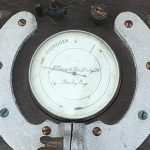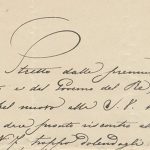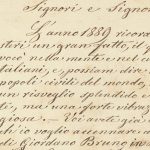Presso le cascate di Cataract
Atto di vendita del 1853, registrato nel 1857, con il quale Theodore Jennings vende a Thomas Willis un lotto cittadino a Cataract nella contea di Owen, Indiana per 20 dollari.
Formato 16 ” per 13 ” su carta azzurra
Prima facciata
Theodore C. Jennings
& wife
to Thomas H. Willis
DEED.
Received for record,
September 10 th 1857, at
1 o’cloch P M., and
Recorded in Record 16
Page 510 in my office
David Hannis Recorder
for Owen County
=====================
Duly entered for taxation,
September 10 1857.
John J. Cooper Auditor.
=====================
Sold by Delzell & Tyler, Indianapolis.
The $ 100
Seconda facciata
This Indenture Witnesseth, That William M.Wright
Theodore C. Jennings and Emily A. Jennings
his wife
in consideration of twenty
Dollars
to them paid by Thomas Willis
the receipt whereof is
hereby acknowledged, do
hereby bargain, sell and convey to the said Thomas Willis
his
heirs and assign, forever, the following Real Estate, in Owen County
and State of Indiana and described as follows, to=wit: lot N°
twenty two in in the Owen of Cataract in section
N°…2 Jaronship, N° Eleven Range, N° four
west
– – – – – – – – – – – – – – – – – – – – – – – – – – – – – – – – – – – – – – – – – – – – – – – – – – – – – – –
together with all privileges and appurtenances to the same belonging
To have and to hold the same to the said Thomas Willis
be heirs and assigns
forever The grantors the is heirs and assigns hereby covenanting with
the grantee his heirs and assigns, that the title so conveyed is clear, free (segue)
Terza facciata
and unincumbered, that they arelawfully seized of the premises aforesaid, as of a
sure, perfect, and indefeasible estate of inheritance in fee simple; and that be
will warrant and defend the same against all claims whatsoever.
In Witness Whereof, the said Theodore C. Jennings
and Emily A. Jennings
his wife who hereby relinquish their dower in
said premises, have hereunto set their hands and seals this 10th day
of August 1853
Theodore C. Jennings seal.
Emily A. Jennings seal.
State of Indiana, Owen County.
Personally appeared before me, the subscriber, a leiate up the
peace in and for said County Theodore C.
Jennings and Emily A. his every
the garantors in the above conveyance, and acknowledged the same to be theis voluntary act and deed.
Witness my hand and seal, this 10th day of
August 1853. James N. Hattanm Op Seal.
Theodore C. Jennings
Come suggerisce il suo nome, la comunità a Cataract, Indiana, è stata intimamente legata alle cascate di Mills Creek, originariamente conosciuta come River Eel. Il colonizzatore iniziale Isaac Teal costruì un mulino nel 1820 nei pressi delle cascate più basse. Theodore Jennings, attratto dalla bellezza delle cascate e dal loro potenziale economico acquistò 1.000 acri lì nel 1841 e, in onore del Governatore Jonathan Jennings, suo parente, denominò la località Jennings Township.
Nel 1841 acquistò le rovine del mulino di Teal, le cascate e le terre circostanti per un totale di 1.000 acri. Molto rapidamente, Jennings costruì mulini ad acqua per la produzione della farina, per follare la lana, produsse botti e infine commerciò legname. Nel 1876, fu costruito il ponte Cataract Falls Covered, mentre la comunità cresceva intorno a questi nuclei produttivi e raggiunse circa 100 abitanti, è stato il principale insediamento di Jennings Township.
Tratto da: CATARACT FALLS BRIDGE Spanning Mill Creek, bypassed section of CR279 (Cataract Falls – Unit of Leiber State Recreation Area) Cataract Owen County Indiana
Altro su: www.onsitear
John J. Cooper
Giudice di pace, è un nativo del Kentucky, nato il 2 giugno 1818. I suoi genitori John e Polly (Wilson) Cooper, vivevano in Wayne County, Ky. Il padre morì nel corso dell’anno 1823. La madre si è trasferita poi a Owen County, Indiana, con John nel 1830. Dopo otto anni a Owen County, la madre affittò una fattoria nella Contea di Monroe insieme a John, che rimase con lei un anno. John Cooper tornò poi a Owen County, e si sposò nel mese di ottobre dello stesso anno 1839, con Elizabeth McDonald, figlia di William e Ruth McDonald, cittadini rispettabili di Owen County.
Dopo il suo matrimonio, il signor Cooper svolse l’attività di coltivatore in estate ed insegnante presso la scuola locale in inverno per dieci anni. Nel 1850, venne eletto Sindaco della contea nella lista del partito Whig, il suo primo mandato fu apprezzato, venne così rieletto nel 1852 servendo fedelmente e onorando la carica durante il secondo mandato. In seguito continuò a volgere la sua attività di uomo d’affari. Fù nominato giudice di pace. Nel 1881, ricevette l’incarico di rappresentante della Adams Express Company svolgendo una brillante carriera. Durante la sua vita è stato un uomo politico ammirato. Svolse il compito di Fiduciario per dieci anni; è stato Commissario della contea, Supervisore e Governatore. Membro attivo della Chiesa Cristiana per quarantadue anni e membro della AF & AM e delle Fraternità IOOF.
Debbie Jennings “Storia della contea di Owen 1884” Charles Blanchard, Chicago: F.A. Battey & Co Editori.. 1884. F.A. Battey. Fw Tepple Washington , Contea di Owen, Indiana, pagina 833
11 Settembre 1853
Il giorno in cui fu registrato il documento, a 2.800 Km, a ovest nello Utah e lungo l’Old Spanish Trail, nella località di Mountain Meadows si consuma un feroce massacro nei confronti di una carovana di pionieri (la carovana Baker-Fancher), provenienti dall’Arkansas e diretti in California ad opera di una comunità di mormoni capeggiata da John Doyle Lee e spalleggiata da una tribù di indiani Paiute. Vi furono circa 120 vittime comprese donne e bambini.
Fonte



